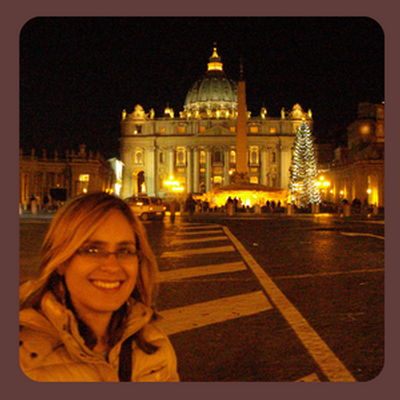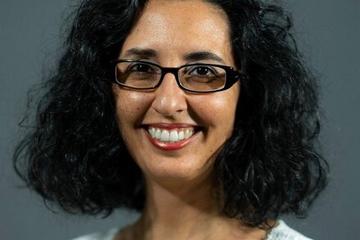
Janette Ann Cortés Núñez, physician and psychiatrist specialized in liaison psychiatry in Mexico, talks about her decision to move to Rome to study for a diploma in spirituality.
What was your area of study and which pontifical university did you choose and why?
I went to Rome to study for a diploma in spirituality because I wanted to deepen my faith. I chose the Pontifical Gregorian University because I wanted to learn more about Ignatian spirituality, as I admire the work the Jesuits had done and still carry out in some of the less privileged areas of Mexico.
Starting the diploma program was a memorable adventure. My husband, who was already in Rome studying for his PhD in philosophy, took care of my enrolment and, during the first two weeks of the semester, even attended lessons and took notes for me while I was completing my medical training in Mexico City. Once in Rome, I had to catch up on my classes and learn the dynamic of the university and the city with the support of The Lay Centre staff and community.
What opportunities did your studies offer and how are your studies and research at the pontifical university related to the work you do today?
While treating patients as a mental health professional I realized how much I needed to revitalize and renew my personal relationship with God: How could I find harmony between religion and science? How could I be a Catholic and a psychiatrist? How could I be coherent? How could I serve in a better way? I certainly don’t have all the answers but my studies gave me a precious opportunity to contemplate my personal history with a different perspective, to my vocation and discover new possibilities.
Studying spirituality has allowed me to widen my perspective about the human experience in order to better understand and help my patients, without neglecting the importance of spirituality and religion in their lives and in their clinical treatment and outcome.
What advice would you give lay women who would like to study in Rome?
I would tell them to be courageous, that there is place for us in pontifical universities and that, in fact, our presence is decisive for the academic life and daily experience of the scholars and professors.
The Lay Centre is an exceptional place to live while studying in Rome and undoubtedly a point of reference for getting in touch with the different realities of Church life, the laity and interreligious dialogue. Living at The Lay Centre was a key determining factor that completely shaped my experience in Rome. Sharing the simplicity, the beauty, the difficulties and the challenges of daily life with people from around the world and from different cultural and religious traditions in an environment of hospitality, friendship and prayer was just invaluable. Being in Rome, studying spirituality at the Gregorian and living at The Lay Centre brought about a watershed moment in my life.
How did your studies help you to become more able to serve the Church and society?
Once I returned to Mexico, I started collaborating with the psychiatric services of the hospital of the Archdiocese of Mexico City. Bringing together psychiatry and spirituality has helped me to collaborate with priests and bishops in the evaluation, follow-up and treatment of patients. An adequate collaboration between the disciplines of spirituality and psychiatry avoids the pathologizing of religious experience. It also allows the identification of cases in which what appears to be a religious experience is, in fact, a psychopathological manifestation and therefore merits psychiatric treatment. This collaboration contributes to the right of every human being “to live with dignity and to develop integrally” (“Fratelli tutti,” 107).
What do you think is an area of most pressing concern in your area of study or of your profession?
In psychiatry, it would be a challenge to have comprehensive mental health care that is scientifically based and, at the same time, culturally sensitive. Spirituality and religion are concerned with the core beliefs, values and experiences of human beings, so their relevance to the origins, understanding and treatment of psychiatric disorders should be central to clinical and academic psychiatry.
In the Church, the challenge would be to promote the importance of mental health in order to achieve integral and harmonious human development. There is a great need to fight against the stigma and myths that exist around mental health. On the other hand, in light of the current sexual abuse issues, it is essential to contribute to the early detection of potential mental health problems among seminarians and consecrated women and men. It would be beneficial if those suffering from a mental health issue could benefit from therapeutic accompaniment and treatment.
What, in your opinion, is the importance of the role of laity in the Church at a decisional level?
Lay people should help enrich and broaden the perspective of Church life, so the Church can take paths of action that are consistent with the challenges, difficulties and problems people face every day. Reality is complex. Usually easy answers do not work and there is a great need for accompaniment and discernment. The role of lay people is therefore crucial in bringing the Church to what Pope Francis calls “the peripheries.”
Janette Ann Cortés Núñez, MD, is a wife, mother, physician and psychiatrist, specialized in liaison psychiatry. She lives in Morelia, Mexico, where she is an attending psychiatrist at the Psychiatric Hospital of Morelia, and has collaborated with the psychiatric services of the hospital of the Archdiocese of Mexico City. She completed a two-year diploma program in spirituality at the Pontifical Gregorian University in Rome.
Photos courtesy Janette Ann Cortés Núñez. We also asked our alumnae to share a special photo from their Lay Centre days. Janette shared the one below - Christmas in Rome.



